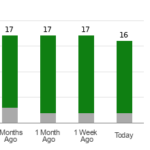Delta Air Lines, Inc. (DAL) is a renowned Atlanta-based airline that has been soaring through domestic and international skies since its inception in 1924. With a market capitalization of $25.56 billion, Delta operates a fleet of over 1200 aircraft, connecting over 275 destinations across 50 countries. It provides a wide array of aviation services including passenger and cargo transport, aircraft management, and aviation solutions.
Despite its strong presence, DAL has hit turbulence in the market, witnessing a 27% plunge from its recent highs, marked by a harsh 16% descent in the last month alone. Year-to-date figures reveal a downturn of over 2%, painting a gloomy backdrop for investors eyeing the stock amidst a bullish S&P 500 Index. This nosedive has sparked a debate among market players – is it now a steal or a slippery slope?

The Turbulent Earnings Ride of Delta
Mid-July brought Delta’s Q2 earnings report, a mixed bag that left Wall Street somewhat unimpressed. While the airline surpassed revenue expectations at $16.66 billion, its earnings per share lagged behind forecasts at $2.36, missing the $2.37 estimate. To compound the issue, Delta’s expansion efforts resulting in an 8% capacity boost backfired, leading to a dismal 2.6% drop in unit revenue – a key metric closely watched by analysts.
Looking forward, Delta management’s grim outlook suggests a potential year-over-year earnings dip for the current quarter, although revenues are projected to hike by 2% to 4%. This cautious forecast has added fuel to the downward spiral, with investors reevaluating their stakes in the airline company.
The Fallout and Cyber Storm
As if earnings woes weren’t enough, Delta faced a 5-day nightmare in July due to a global outage on Microsoft platforms using CrowdStrike cybersecurity software. Caught in the storm, Delta now seeks recompense from both Microsoft and CrowdStrike, estimating a heavy blow of $500 million due to more than 7,000 flight cancellations.
Delta CEO Ed Bastian highlighted the brand and reputational damage caused by the outage, triggering fiery responses from Microsoft and CrowdStrike with both sides embroiled in a legal tussle. The debacle led to a ripple effect, prompting U.S. Department of Transportation scrutiny and a looming class action lawsuit against Delta.
Analysts’ Altitude Check on Delta Stock
Amidst the turbulence, analysts remain bullish on Delta, projecting a unanimous “Strong Buy” rating across all 19 brokerage firms covering the stock. With a mean price target of $60.59 signaling a promising 54% upside potential, optimism still lingers in the air for the beleaguered airline.

Trading at a modest 6.36x forward earnings, DAL may seem like a bargain. However, cautious investors are advised to tread carefully in these uncertain skies lest they get caught in the tailspin of Delta’s challenges.





